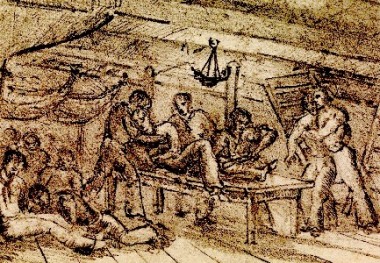Date: June 22, 1767
“To Misophlauros. Sir,
I have read your publication in the last Evening Post, and cannot think that your recapitulation of Dr. Young’s arguments to justify his conduct, has at all served him. – The authors mentioned by Dr. Young, are in the hands of many gentlemen of the Faculty, and whoever reads them with a moderate degree of attention, and a tolerable capacity, will be surpriz’d to find that a person so ingenious as Dr. Young always declar’d himself to be, should so miserably mistake the intention & scope of their writings. Nor are you, my friend Misophlauros, more happy in adducing authorities, than your client, when you attempt to exculpate him, by relating the case of the gentleman who went to Scotland for the recovery of his Health. The manner of introducing this case is so uncouth, and the instance itself is so very little to the purpose, that one would almost imagine Dr. Young himself to have been the author. Pray what could induce you to suppose that this precedent which you have bro’t, can influence the present debate. “A gentleman melting in night-sweats, almost continual fever, violent cough, vastly emaciated and weak, repaired to Scotland for the recovery of his health;” he was frequently bled by order of his Physicians. – Now altho’ it is in my power in a great measure to refute this account which is given of the gentleman’s health while in Boston, yet I will readily admit it for truth; since from your own account the cases do not appear to be similar. Mrs. Davis was confined to her chamber, and after Dr. Young’s bleeding her, never rose from her bed. The gentleman you mention, was able to make a voyage to Scotland. And I might relate other circumstances which would prove that the vessels were not so much debilitated as you would insinuate. Mrs. D. had ulcers formed upon her lungs: It does not seem to have been the case with the gentleman you mention. And lastly, Mrs. D. was expectorating purulent matter from the lungs, which was one of the principal reasons for condemning Dr. Young’s practice, as blood-letting naturally tended to, and actually did suppress that evacuation which nature pointed out as the only means of safety to this sinking patient. – But we do not find any such expectoration mentioned in your account – of the gentleman in Scotland; and therefore as the cases are different in the most material circumstances, what might be proper in once case, might be fatal in the other. – Nor can I think that the physicians who prescribed to the gentleman in Scotland, will think themselves at all honored by having their practice brought in to support such conduct as Dr. Young’s was in the case before us.
But as both you and the Doctor seem convinced of the impossibility of defending this practice upon rational philosophical principals, and are fond of resting the matter upon authorities, I freely join issue, and declare, that if you can find any author of reputation, ancient or modern, who directs bleeding in a weak relaxed state of vessels, an impoverished diminished state of blood, with a purulent expectoration from the lungs, I will heartily acquit Dr. Young, tho’ I should still condemn the practice. But before you engage in search for such a case, let me relate the following anecdote.
A ship of war unfortunately lost their surgeon – his mate who was but little qualified, was oblig’d to supply his place: Soon after this an engagement happened, in which one of the sailor’s had the bones of his leg so fractured by a ball, that the new surgeon thought fit to take it off, which he did; but being entirely unacquainted with the method of securing the arteries by ligatures, and finding a very great flow of blood, which he expected (unless prevented) would prove fatal, he immediately took up the knife which he had used in taking off the leg, and cut off the patient’s nose, by the haemorrhage from both these wounds the patient soon expired: upon being examined, the Doctor said in his defence, that he had several times seen his master stop bleedings from the nose, by taking blood from the foot; and he did not know why taking blood from the nose, should not stop a haemorrhage from the leg, as readily as taking blood from the foot stopped a haemorrhage from the nose: he therefore insisted he had a sufficient warrant for his own practice. This little piece of history, I hope may be serviceable both to you and Dr. Young.
I am, Sir, in perfect good humour, your humble servant,
Philo Physic.
Source: Boston Gazette, June 22, 1767, issue 638, p. 2
Commentary: In the context of the on-going malpractice controversy involving proper indications for bleeding of tuberculous consumptives, the newspaper salvos have come to involve Dr. Miles Whitworth and Joseph Warren’s pseudonymous Philo Physic on one side, and Dr. Thomas Young and another pseudonymous Misophlauros on the other. Warren accuses Dr. Young as masquerading as Misophlauros.
Warren offers a darkly humorous medical anecdote, a rarity arising from a physician of the period, ridiculing Young’s clinical logic. Implying that Dr. Young was murderously unqualified, Warren offers up an invented farcical scene of a naval surgeon’s mate fatally bleeding a wounded sailor with a minor foot wound, arguing that such a fatal maneuver was equivalent to an apparently accepted practice of therapeutic bleeding from the foot for a minor nosebleed.

 Follow
Follow